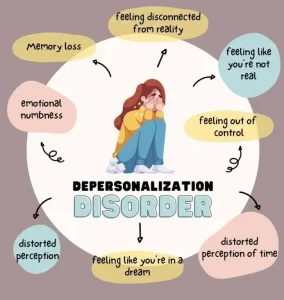Overview
Diagnosis
To diagnose depersonalization-derealization disorder, your doctor will conduct a series of evaluations to understand your symptoms and rule out other possible causes.
-
Physical exam – This helps determine if your symptoms are linked to an underlying medical condition, the effects of certain medicines, or substance use such as alcohol or recreational drugs.
-
Lab tests – Laboratory tests may be done to check whether any physical or medical issues are contributing to your symptoms.
-
Mental health evaluation – A detailed discussion about your symptoms, emotions, thoughts, and behavior patterns helps identify whether you have depersonalization-derealization disorder or another mental health condition.
Treatment
The primary treatment for depersonalization-derealization disorder is talk therapy, although medicines may sometimes be included to manage associated symptoms.
Talk therapy
Talk therapy is the most effective form of treatment. The aim is to reduce or eliminate symptoms and help you regain a sense of connection to yourself and your surroundings. Common types include cognitive behavioral therapy (CBT) and psychodynamic therapy.
Talk therapy can help you:
-
Understand why depersonalization and derealization occur
-
Learn grounding techniques that redirect your focus away from symptoms
-
Develop coping strategies for stressful situations
-
Process emotions linked to past trauma
-
Identify and manage related mental health issues such as anxiety or depression
Medicines
There are currently no medicines proven to directly treat depersonalization-derealization disorder. However, certain medications may be prescribed to address related symptoms such as depression or anxiety.
Coping and support
Living with depersonalization-derealization disorder can be distressing, but effective treatment and self-care can make symptoms manageable.
Helpful coping strategies include:
-
Following your treatment plan consistently and practicing therapy techniques regularly
-
Learning about the disorder through reliable books and trusted online resources
-
Staying connected with supportive family members, friends, or community leaders
Preparing for your appointment
You may begin by visiting your primary care doctor, who can refer you to a neurologist or a psychiatrist for further evaluation. Taking a family member or close friend along can be helpful—they might recall details you forget to mention.
Before your appointment, prepare by listing:
-
Your symptoms, even those that seem unrelated
-
Major life events, stressors, or recent changes
-
All medications, supplements, and their doses
-
Questions you want to ask your doctor
Questions to ask your doctor
-
What could be causing my symptoms?
-
Are there other possible explanations?
-
Do I need any tests to confirm the diagnosis?
-
What treatment options do you recommend?
-
Should I see a specialist?
-
Are there educational materials or websites you suggest?
What to expect from your doctor
Your doctor may ask questions such as:
-
When did your symptoms begin?
-
Are they constant or occasional?
-
What makes your symptoms better or worse?
-
Do you have any existing health or mental health conditions?
-
Do you use alcohol, drugs, or herbal supplements?
Being prepared and open during your appointment helps your doctor better understand your experience and create an effective treatment plan.
Advertisement

